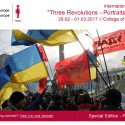Conferences and Calls for Papers
HOME >
Conferences and Calls for Papers
Conferences and Calls for Papers
on Conflict and Harmony in Eurasia in the 21 Century: Dynamics and Aesthetics CHUNG-ANG UNIVERSITY, SEOUL, KOREA June 3-4, 2017 Conference Theme The Korean Association of Slavic and East European Studies (KASEUS) will host the 8th East Asian Conference on Slavic and Eurasian Studies, with the support of CAREECAS (China) and JCREES (Japan) at Chung-Ang…
Read more >>

28 February (Tuesday) – 1 March 2017 (Wednesday) (the languages of the conference: English, Polish and Ukrainian) The conference program is here. >>>>
Read more >>
The 41st Annual and International Conference of the Irish Association for Russian, Central and East European Studies will take place at the National University of Ireland Galway, 4-6 May 2017. Scholars from any relevant discipline, including linguistics, literary studies, sociology, history and political science, are invited to propose papers or panels which address the theme…
Read more >>
The British Association of Slavonic and East European Studies (BASEES) invites proposals for panels, roundtables and papers for its 2017 Annual Conference. The conference will be held 31 March – 2 April and will be based at Fitzwilliam College, Cambridge, United Kingdom. The 2016 conference attracted more than 400 delegates. Panels, roundtables and papers are…
Read more >>
The Eastern Partnership under strain – time for a rethink?, Iaşi, Romania, 20-21 May, 2016 The 5th anniversary edition of EURINT will mark an important milestone for our conference series and focus on the latest political, economic and security developments from the Eastern Partnership area and the broader eastern neighbourhood region. The 2016 conference is…
Read more >>
Since the fall of the Soviet Union, history of science has made significant progress. One topic however was disregarded: scientific utopia, fascinating and intriguing, because situated on the border between literature and science. Nikolai Krementsov is one of the few historians to deal with this topic. In Revolutionary Experiments, on the basis of several literary…
Read more >>
Vytautas Magnus University in cooperation with the Association for the Study of Nationalities (ASN) is pleased to announce the joint conference “Europe, Nations, and Insecurity: Challenges to Identities”. The Conference will be held on 30 June – 2 July 2016 in Kaunas, Lithuania. The panels of the conference will embrace a wide range of topics…
Read more >>
Description of the Conference This is the next Krakow conference on Russian philosophy. In 2015 we dealt with the links between Post-Secularism and Russian religious philosophy, previous editions have focused on the relation of Christianity and culture, the reception of Russian thought in Europe, Russian symbolism and other topics. Each year our conference brings together…
Read more >>
The International Congress of Slavists will be held in late summer 2018 in Belgrade, Serbia. The general plan will contain a day of arrival (August 19), a day of departure (August 27), and six working days for the Congress split into 3-day segments separated by a free day (August 23) for excursions organized by the…
Read more >>
AWARDS for Best Doctoral Student Papers, ASN Harriman Joseph Rothschild Book Prize The Nationalities Papers Opening Reception The ASN Convention, the largest international and inter-disciplinary scholarly gathering of its kind, welcomes proposals on a wide range of topics related to nationalism, ethnicity, ethnic conflict and national identity in regional sections on the…
Read more >>



